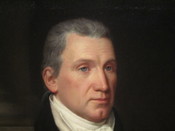We have had many great presidents during the early years of the nation. George Washington, Thomas Jefferson, and James Monroe were among them. During the early years of Washington's presidency, the country was in national debt. After the war the country owed masses of money. The country owed $81,497,000, but it was on receiving a total income of $4,419,000. Now, the government borrowed money through bonds. A bond is a certificate that promises to repay the money loaned, plus interest, on a certain date. Alexander Hamilton came up with a plan to repay both federal and state debts. He wanted the government to buy up all the bonds issued by the government, and then he planned to issue new bonds to pay off all the debts. As the economy improved, the government would be able to pay off the new bonds.
James Madison opposed Hamilton's plan. He thought that the plan would let speculators make a profit, but Hamilton argued that the government needed to pay off its debts otherwise America wouldn't have investors that it greatly needed.
In the end, Hamilton agreed on a compromise. While in office Washington had many great accomplishments. One of his greatest accomplishments came in 1791 when he signed the national bank charter. It was called the Bank of the United States. The government would deposit money from taxes in the Bank, and the bank issued paper money to pay the government's bills and to make loans to farmers and businesses. A protective tariff was called for by Hamilton. A protective tariff is a tariff, or tax, meant to protect local industry from foreign completion. In North, people supported the tariff, but in the South they did not. In the end, Congress did pass a tariff, but it was much lower than what...


